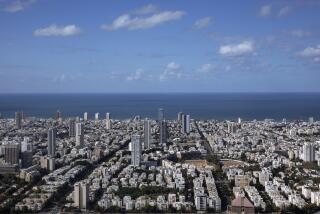U.S. mends frosty relations with Al Jazeera
The Obama administration is courting the pan-Arab television network Al Jazeera in an attempt to improve a history of testy relations with one of the most influential news outlets in the Middle East.
The new policy of engagement has been apparent in recent weeks as a State Department media outreach office in Dubai, United Arab Emirates, has sought to place Arabic-speaking diplomats on Al Jazeera to lay out Washington’s talking points about the protests roiling the region.
State Department officials, including chief spokesman Philip J. Crowley and Assistant Secretary for Near Eastern Affairs Jeffrey Feltman, have gone on Al Jazeera more than a dozen times in the last month. Another recent guest was Sen. John F. Kerry (D-Mass.), chairman of the Senate Foreign Relations Committee.
Al Jazeera is crucial because so many households in the Middle East turn to it in times of turmoil, said Dana Shell Smith, deputy assistant secretary for international media engagement, an office created last summer to reach out to such outlets.
“If we are not in the conversation, people will be speaking for us or about us,” said Shell Smith, who speaks Arabic. “We need to make sure we are out there speaking for ourselves.”
A State Department policy review completed in December has resulted in more diplomats and administration officials appearing on Al Jazeera, which reaches about 60 million viewers across the world.
The State Department has assigned staff in media hubs such as London, Dubai and Brussels to field requests from Al Jazeera and other Arabic-language media.
Defense Secretary Robert M. Gates, Army Gen. David H. Petraeus, Secretary of State Hillary Rodham Clinton and Adm. Michael G. Mullen, chairman of the Joint Chiefs of Staff, all have appeared on the network’s Arabic and English channels in the last year.
The U.S. government has a tense history with Al Jazeera. Many U.S. citizens got their first exposure to it after the Sept. 11, 2001, attacks, when it broadcast a taped message from Osama bin Laden, its logo emblazoned in the corner of the screen.
Former Secretary of Defense Donald H. Rumsfeld once accused it of spreading “vicious, inaccurate and inexcusable” reports about U.S. actions in Iraq.
For its part, Al Jazeera officials accused the U.S. of intentionally firing missiles at their offices in Kabul, Afghanistan, in 2001 and Baghdad in 2003.
Today there is a “healthy tension” with Al Jazeera, said Shell Smith, who served for two decades as a foreign service officer in the Middle East and Asia, and has seen how Al Jazeera and other networks have helped break state media monopolies.
Tony Berman, Al Jazeera’s chief strategic advisor for the Americas, said that multiple meetings with U.S. officials have smoothed the relationship. Clinton had a frank, one-hour discussion with Al Jazeera’s top executives during a visit to Qatar a year ago that seemed to clear the air, Berman said.
“The cold war that existed between the Bush administration and Al Jazeera has totally ended,” Berman said. “Now it’s a professional relationship between an aggressive government and an aggressive news organization.”
Created in 1996 by the Qatari government, Al Jazeera “is becoming a global media power,” said a November report by the State Department’s inspector general.
Besides its Arabic news operation, the network has a dedicated Arabic-language documentary channel, a children’s programming channel and an English-language news channel. The English-language channel airs around the world, but only in a few U.S. markets. The Qatar government provides a subsidy of about $750million a year for its operations.
Viewers accustomed to state-controlled media have flocked to it, believing that “Al Jazeera was just an extension of what they were talking about behind closed doors,” said Mohammed el-Nawawy, a professor of communications at Queens University of Charlotte in North Carolina, who has studied the network’s influence.
The State Department inspector general’s report sketched the dilemma facing the U.S. government: “The network on occasion stakes out controversial and inflammatory positions on issues of interest to the United States. On the other hand, its reporting does support other U.S. objectives in human rights, democratization and environmental protection, among other issues.”
El-Nawawy and others believe that the network’s saturation coverage of protests in Tunisia may have partly inspired the current unrest in Egypt. But he contended that its coverage has limited ability to effect change.
“There is no question that Al Jazeera has instigated and has pushed the envelope for many governments,” he said. “But what we are seeing is what people themselves are doing. The media are a catalyst, but they don’t have unlimited powers.”
More to Read
Start your day right
Sign up for Essential California for news, features and recommendations from the L.A. Times and beyond in your inbox six days a week.
You may occasionally receive promotional content from the Los Angeles Times.







